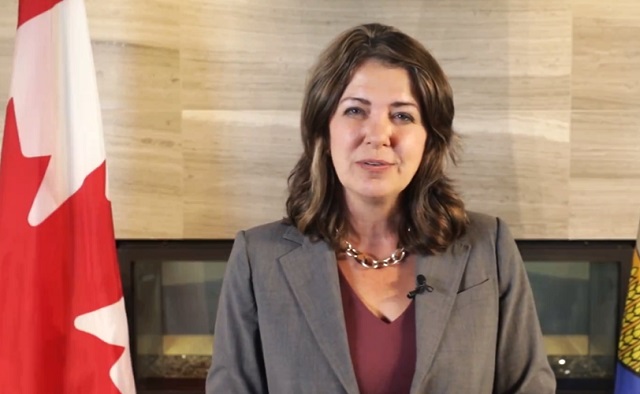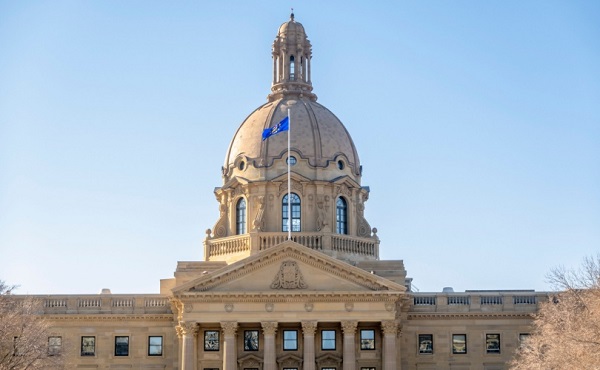Alberta
Alberta Premier Danielle Smith promises bill protecting rights to refuse vaccines is coming

From LifeSiteNews
The plan is to introduce an amended Bill of Rights this fall that includes protections for individuals’ personal medical decisions.
Alberta Premier Danielle Smith has promised that the province’s Bill of Rights will be amended this fall so that there are protections added for people’s personal medical decisions that most likely will include one having the right to refuse a vaccine.
Smith’s promise to add protections for personal choice on vaccinations comes because of the COVID jab mandates put in place for a time in Alberta under former Premier Jason Kenney.
Speaking to Albertans at a recent town hall in Bonnyville, Smith said that the COVID crisis resulted in many people being discriminated against for their own medical decisions and that “it shouldn’t have happened.”
Smith, who leads the United Conservative Party (UCP), said that she believes “every person has to be able to do their own assessment, their own health assessment, to be able to make those decisions.”
The original plan by Smith was to add protections for one’s vaccine status directly Alberta Human Rights Act (AHRA). However, this plan was nixed after she was advised by Public Health Emergencies Governance Review Panel chair Preston Manning that this was not the right legislation for an additional protection.
Instead, Smith promised that a better “law” dealing directly with vaccine status will be forthcoming.
On Monday, Smith confirmed on X that an updated version of the Bill of Rights is coming.
“It’s time. Let’s get this done,” she wrote.
Last year, Smith, as reported by LifeSiteNews, promised to enshrine into “law” protections for people in her province who choose not to be vaccinated as well as strengthen gun rights and safeguard free speech by beefing up the provincial Bill of Rights.
“You have my commitment, no one’s going to be forced to be vaccinated,” Smith told Alberta blogger Shaun Newman.
On Smith’s first day on the job and only minutes after being sworn in, she said that during the COVID years the “unvaccinated” were the “most discriminated against” group of people in her lifetime.
She took over from Kenney as leader of the UCP on October 11, 2022, after winning the party leadership. The UCP then won a general election in May 2023. Kenney was ousted due to low approval ratings and for reneging on promises not to lock Alberta down during COVID.
Smith promptly fired the province’s top doctor, Deena Hinshaw, and the entire Alberta Health Services board of directors, all of whom oversaw the implementation of COVID mandates.
Under Kenney, thousands of nurses, doctors, and other healthcare and government workers lost their jobs for choosing to not get the jabs.
While Smith has not said much regarding the COVID shots since taking office, she has allowed her caucus members to have broad views when it comes to known safety issues related to the jabs.
UCP MLA Eric Bouchard hosted a sold-out event titled “An Injection of Truth” that featured prominent doctors and experts speaking out against COVID vaccines and mandates.
“Injection of Truth” included well-known speakers critical of COVID mandates and the shots, including Dr. Byram Bridle, Dr. William Makis, canceled doctor Mark Trozzi and pediatric neurologist Eric Payne.
The COVID shots were heavily promoted by the federal government and all provincial governments in Canada, with the Alberta government under Kenney being no exception.
The mRNA shots have been linked to a multitude of negative and often severe side effects in children.
Alberta
B.C. would benefit from new pipeline but bad policy stands in the way

From the Fraser Institute
By Julio Mejía and Elmira Aliakbari
Bill C-69 (a.k.a. the “no pipelines act”) has added massive uncertainty to the project approval process, requiring proponents to meet vague criteria that go far beyond any sensible environmental concerns—for example, assessing any project’s impact on the “intersection of sex and gender with other identity factors.”
In case you haven’t heard, the Alberta government plans to submit a proposal to the federal government to build an oil pipeline from Alberta to British Columbia’s north coast.
But B.C. Premier Eby dismissed the idea, calling it a project imported from U.S. politics and pursued “at the expense of British Columbia and Canada’s economy.” He’s simply wrong. A new pipeline wouldn’t come at the expense of B.C. or Canada’s economy—it would strengthen both. In fact, particularly during the age of Trump, provinces should seek greater cooperation and avoid erecting policy barriers that discourage private investment and restrict trade and market access.
The United States remains the main destination for Canada’s leading exports, oil and natural gas. In 2024, nearly 96 per cent of oil exports and virtually all natural gas exports went to our southern neighbour. In light of President Trump’s tariffs on Canadian energy and other goods, it’s long past time to diversify our trade and find new export markets.
Given that most of Canada’s oil and gas is landlocked in the Prairies, pipelines to coastal terminals are the only realistic way to reach overseas markets. After the completion of the Trans Mountain Pipeline Expansion (TMX) project in May 2024, which transports crude oil from Alberta to B.C. and opened access to Asian markets, exports to non-U.S. destinations increased by almost 60 per cent. This new global reach strengthens Canada’s leverage in trade negotiations with Washington, as it enables Canada to sell its energy to markets beyond the U.S.
Yet trade is just one piece of the broader economic impact. In its first year of operation, the TMX expansion generated $13.6 billion in additional revenue for the economy, including $2.0 billion in extra tax revenues for the federal government. By 2043, TMX operations will contribute a projected $9.2 billion to Canada’s economic output, $3.7 billion in wages, and support the equivalent of more than 36,000 fulltime jobs. And B.C. stands to gain the most, with $4.3 billion added to its economic output, nearly $1 billion in wages, and close to 9,000 new jobs. With all due respect to Premier Eby, this is good news for B.C. workers and the provincial economy.
In contrast, cancelling pipelines has come at a real cost to B.C. and Canada’s economy. When the Trudeau government scrapped the already-approved Northern Gateway project, Canada lost an opportunity to increase the volume of oil transported from Alberta to B.C. and diversify its trading partners. Meanwhile, according to the Canadian Energy Centre, B.C. lost out on nearly 8,000 jobs a year (or 224,344 jobs in 29 years) and more than $11 billion in provincial revenues from 2019 to 2048 (inflation-adjusted).
Now, with the TMX set to reach full capacity by 2027/28, and Premier Eby opposing Alberta’s pipeline proposal, Canada may miss its chance to export more to global markets amid rising oil demand. And Canadians recognize this opportunity—a recent poll shows that a majority of Canadians (including 56 per cent of British Columbians) support a new oil pipeline from Alberta to B.C.
But, as others have asked, if the economic case is so strong, why has no private company stepped up to build or finance a new pipeline?
Two words—bad policy.
At the federal level, Bill C-48 effectively bans large oil tankers from loading or unloading at ports along B.C.’s northern coast, undermining the case for any new private-sector pipeline. Meanwhile, Bill C-69 (a.k.a. the “no pipelines act”) has added massive uncertainty to the project approval process, requiring proponents to meet vague criteria that go far beyond any sensible environmental concerns—for example, assessing any project’s impact on the “intersection of sex and gender with other identity factors.” And the federal cap on greenhouse gas (GHG) emissions exclusively for the oil and gas sector will inevitably force a reduction in oil and gas production, again making energy projects including pipelines less attractive to investors.
Clearly, policymakers in Canada should help diversify trade, boost economic growth and promote widespread prosperity in B.C., Alberta and beyond. To achieve this goal, they should put politics aside, focus of the benefits to their constituents, and craft regulations that more thoughtfully balance environmental concerns with the need for investment and economic growth.
Alberta
Alberta introduces bill allowing province to reject international agreements

From LifeSiteNews
Under the proposed law, international treaties or accords signed by the federal government would not apply in Alberta unless approved through its own legislation.
Alberta’s Conservative government introduced a new law to protect “constitutional rights” that would allow it to essentially ignore International Agreements, including those by the World Health Organization (WHO), signed by the federal Liberal government.
The new law, Bill 1, titled International Agreements Act and introduced Thursday, according to the government, “draws a clear line: international agreements that touch on provincial areas of jurisdiction must be debated and passed into law in Alberta.”
Should the law pass, which is all but certain as Alberta Premier Danielle Smith’s Conservatives hold a majority government, it would mean that any international treaties or accords signed by the federal government would not apply in Alberta unless approved through its own legislation.
“As we return to the legislature, our government is focused on delivering on the mandate Albertans gave us in 2023 to stand up for this province, protect our freedoms and chart our path forward,” Smith said.
“We will defend our constitutional rights, protect our province’s interests and make sure decisions that affect Albertans are made by Albertans. The federal government stands at a crossroads. Work with us, and we’ll get things done. Overstep, and Alberta will stand its ground.”
According to the Alberta government, while the feds have the “power to enter into international agreements on behalf of Canada,” it “does not” have the “legal authority to impose its terms on provinces.”
“The International Agreements Act reinforces that principle, ensuring Alberta is not bound by obligations negotiated in Ottawa that do not align with provincial priorities,” the province said.
The new Alberta law is not without precedent. In 2000, the province of Quebec passed a similar law, allowing it to ignore international agreements unless approved by local legislators.
The Smith government did not say which current federal agreements it would ignore, but in theory, it could apply to any agreement Canada has signed with the United Nations or the WHO.
-

 Business21 hours ago
Business21 hours agoTrans Mountain executive says it’s time to fix the system, expand access, and think like a nation builder
-

 Business2 days ago
Business2 days agoCarney government risks fiscal crisis of its own making
-

 Alberta2 days ago
Alberta2 days agoB.C. would benefit from new pipeline but bad policy stands in the way
-

 Energy20 hours ago
Energy20 hours agoCAPP calls on federal government to reset energy policy before it’s too late
-

 Frontier Centre for Public Policy2 days ago
Frontier Centre for Public Policy2 days agoChurches Are All That Stands Between Canada And Tyranny
-

 Alberta2 days ago
Alberta2 days agoAlberta introduces bill allowing province to reject international agreements
-

 Media13 hours ago
Media13 hours agoCarney speech highlights how easily newsrooms are played by politicians announcing the same things over and over again
-

 Business2 days ago
Business2 days agoTrump Admin Establishing Council To Make Buildings Beautiful Again




